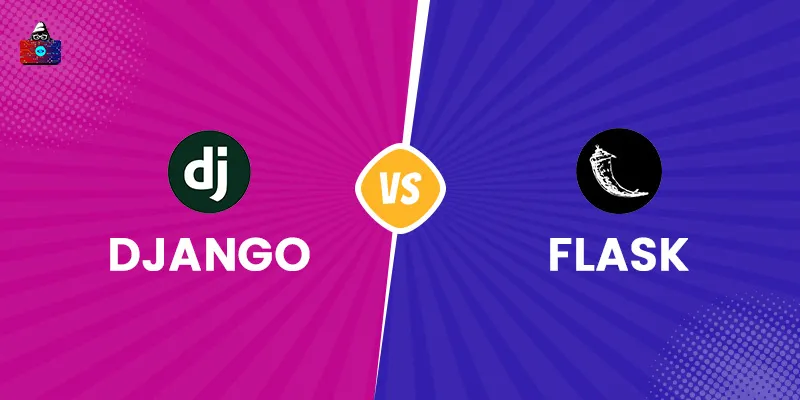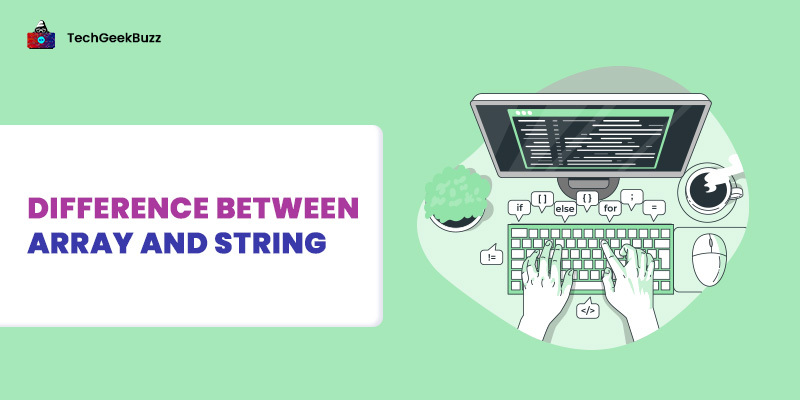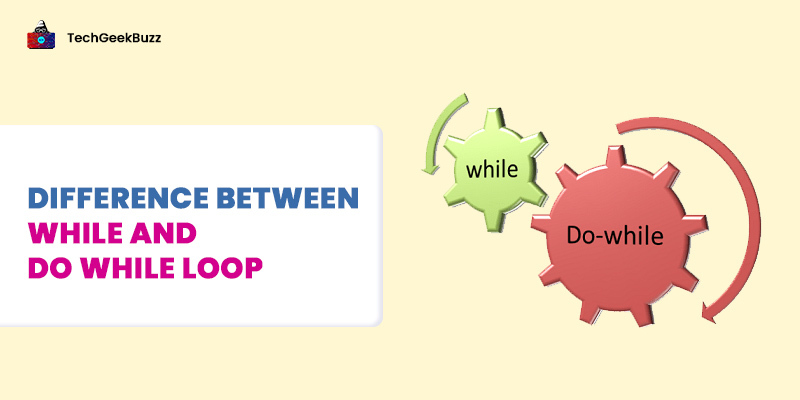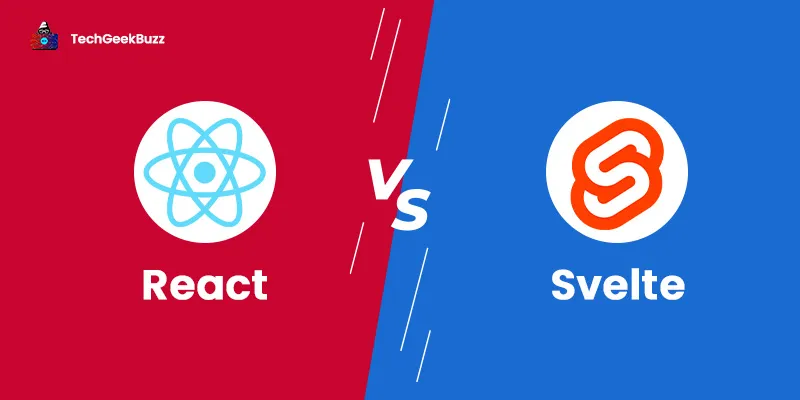For web development with Python, we use its web frameworks. If you are into web development and want to write secure and robust back-end scripts, then Python is for you. Python is one of the most popular programming languages, and with its powerful web frameworks, which can boost your productivity in web development.
Although there are many best Python web frameworks , right now, Django and Flask are leading the market. With one of these two frameworks and Python's clean, readable, and flexible code, you can build a dynamic web application rapidly and easily.
While both frameworks are quite popular among Python developers, Django and Flask have many differences. Often, a Python beginner who has just completed the basics has to face the dilemma of choosing either Django or Flask.
If you are thinking of learning a Python web framework in 2022 and are still confused between Flask and Django, you are reading the right article. Here in this article, we have provided a detailed Django vs Flask comparison.
It will help you to choose the framework most suitable for your Python project. Before jumping to the crux of the article, "Django vs Flask: A Head-to-Head Comparison," let's look at the brief introduction to both these Python web frameworks.
What is Flask?
Flask is an open-source Python micro web framework. A micro framework means it does not come with all the dependencies, which makes it less powerful than a full-stack framework. It does not come with a database abstraction layer, form validation, and any other component. But, it is also lightweight, straightforward, and more flexible. Flask has more than 52K stars on GitHub, which makes it the second most popular Python web framework on the repository.
Moreover, Flask is a minimalistic web framework that does not require specific Python libraries and tools. Nonetheless, you can add extensions and third-party libraries to extend its capabilities. There are a galore of tools and libraries that help in adding new features and components to the Flask framework .
History
Armin Ronacher developed Flask. He was a member of the international group of Python enthusiasts called Pocoo. He got the idea of creating Flask from an April Fool's joke, which was serious enough.
In 2016, the Pocoo team was dispersed, and the development of Flask and its associated libraries was passed to the Pallets project, which was newly formed. Later, Flask gained immense popularity among Python enthusiasts and became the second-most popular Python web framework on GitHub.
Features
The following are the salient features of Flask:
- Flask supports WSGI templates that enable flexibility and scalability of web applications.
- Comes with a development server and debugger.
- Supports unit testing and modular programming.
- Can handle RESTful requests and APIs.
- Leverages Jinja Templating to insert content in HTML, CSS, and JavaScript templates.
- Supports secure cookies and is highly compatible with Google App Engine .
- Although it does not come with many inbuilt features, Python extensions can enhance its functionalities.
- Compatible with cutting-edge technologies, like machine learning, cloud, etc.
Pros
Some of the advantages of Flask are as follows:
- Flask is easy to learn and has a straightforward syntax, making it a beginner-friendly Python web framework.
- You get comprehensive documentation that makes it easy to learn.
- It is a lightweight web framework.
- It is a more flexible and scalable web framework than Django.
- Flask provides full control to developers while creating web applications.
- Facilitates the development of prototypes.
- It integrates easily with databases.
Cons
Here are some of the drawbacks of Flask:
- As Flask does not offer a lot of tools, you need to add extensions to extend its functionality manually.
- It has a small community of developers than Django.
- Not ideal for large projects.
- Developing complex systems using Flask requires a lot of maintenance costs.
- It is pretty challenging to maintain intricate and complex applications.
- There is uncertain security.
Companies/Websites that Use Flask
- Zillow
- Mozilla
- Airbnb
- MIT
- Lyft
What is Django?
Django is an open-source, full-stack Python web framework. It has more than 53K stars on GitHub, which makes it the Python web framework with the most stars and the most popular Python framework on the online repository. It is a fully-featured Python web framework that can be used for any type of web project, big or small. Django follows the MTV (Model Template View) architecture, and it works on the DRY (Don't Repeat Yourself) principle.
With Django , you can primarily focus on creating your web apps without worrying about the complexities of general web development. It is a "Batteries Included" web framework because it comes with built-in components, such as an admin panel, authentication, login, logout, sessions, and messages so that you do not have to write all the code from scratch.
History
When the web programmers Adrian Holovaty and Simon Willison started developing web applications in Python, the development of Django began. It was created in the fall of 2003. During the development, Simon Willison ended the internship, and Jacob Kaplan-Moss was hired. In July 2005, they released Django under the Free BSD license.
Adrian Holovaty was a big fan of the guitarist Django Reinhardt and named the framework after him.
Features
- Follows the MTV architecture, which is similar to MVC (Model View Controller).
- Comes with an Object Relational Mapper (ORM) that manages the model's data for you.
- The popular Python framework also includes a standalone web server and debugger.
- It comes with all the necessary packages, eliminating the need to write code from scratch. So, Django is called 'batteries included.'
- It includes form serialization and validation.
- Comes with many inbuilt middleware classes and security validations.
- It includes tools for generating sitemaps, and it is also immune to malicious web attacks like SQL injection, cross-site scripting, and cross-site request forgery.
Pros
- Django comes with detailed documentation that helps developers learn Django easily.
- It is a highly scalable framework.
- It offers high security.
- Using Django, you can build highly scalable and secure web applications quickly and easily.
- It is an open-source web framework.
- It has a huge community that can help you anytime in your web development.
- The built-in template design ensures faster application development.
Cons
- Not ideal for small projects.
- It is a monolithic framework.
- Django has a steep learning curve for beginners.
- It can't handle multiple requests simultaneously.
Companies/Websites that Use Django
- Coursera
- Udemy
- Spotify
- Netflix
- Mozilla
- Zapier
Django vs Flask: A Detailed Comparison
Here is a detailed comparison between Flask vs Django. After reading this, you will be clear on your decision to choose either Django or Flask.
1. Type of Framework
Django is a full-stack framework, while Flask is a micro web framework.
- Django is a monolithic framework. This means all the Django developers have to follow the strict Django rules and patterns if they want to create an application using Django.
- This makes Django less flexible, and on the other, it is a pulse point for the industry use of Django.
- As Django development is the same for all the web-application, it is easier for developers to maintain and read the Django code.
On the other hand, Flask is a Diversified Python Framework. It is more flexible than Django, and the same Flask application can be built using different extensions and tools.
2. Framework Architecture
Flask follows the MVC architecture, whereas Django follows the MTV architecture.
3. Database Support
Django comes with Django ORM (Object-Relational Mapper), and it is compatible with all the popular SQL DBMS such as MySQL , PostgreSQL, SQLite, etc. Flask does not come with a built-in ORM; however, you can install the SQLAlchemy for the database connectivity.
4. Flexibility
- Django is a fully-featured framework, so you have to abide by its rules and patterns.
- Although Django provides all the essential features you need, you won't have much control over your web application flow.
Flask does not come with many dependencies. Here you will have full control over your web application development.
5. Learning Curve
- Django follows strict patterns and rules. That's why Django has a steep learning curve. And it is also not a beginner-friendly web framework.
- Even To build a simple hello world application, you have to go through many modules.
Flask is lightweight, and so does its learning curve. It is very easy to learn, and unlike Django, to build a simple hello world application, you do not need to create multiple modules. In Flask, it can be done with a single Python file within 3 to 4 lines of code.
6. Built-in Features
Django is a Batteries-Included framework, which means it comes with many built-in components. Django comes with its own built-in admin panel with an Authentication system. Flask is a minimalistic framework; it does not include as many features as Django. If you want an admin panel and authentication system, you have to build it from scratch or install extensions and libraries.
7. Uses
Django is generally used for building full-scale and robust web applications. Flask is generally used to build small and single-page web applications.
8. Template Engine
Django uses Django Template Language (DTL) as a template engine to generate HTML for the web page. Flask uses Jinja2, which is similar to Django (DTL).
9. ORM Support
Django uses an inbuilt Django Object Relations Mapping tool to interact with Relational Modal Database. For Flask, we can use the SQLAlchemy as an ORM tool.
10. Admin Panel
Django comes with a powerful and interactive built-in admin panel. And from the admin panel, you can manage the models and Users for your web application. There is no admin panel in Flask.
11. Performance
Django slightly lacks in performance as compared to Flask. It contains so many modules and classes, which also affect its performance. Flask performance is better than Django. The performance criteria do not affect either of the frameworks' popularity because the frameworks' performance gap is negligible.
12. Community Support
Django has huge community support. So does Flask. Both frameworks are popular amongst python developers, and both have huge community support.
Django vs Flask: A Head-to-Head Comparison Table
The following table highlights the difference between Django and Flask:
|
Django |
Flask |
| Framework Type | |
| Django is a full-stack web framework. Also, it is a monolithic framework that decreases its flexibility. | It is a micro framework. Being a diversified framework makes Flask more flexible. |
| Framework Architecture | |
| It follows the MTV architecture. | Flask follows the MVC architecture. |
| Database support | |
| Django comes with Django ORM, and it is compatible with popular relational database management systems, such as MySQL and PostgreSQL. | Flask does not have a built-in ORM. |
| Flexibility | |
| With Django, you won't have much control over the flow of your web application. | Flask offers you full control over your web application development. |
| Learning Curve | |
| Django has a steep learning curve. | Learning Flask is easy. |
| Built-in features | |
| It is a Batteries Included framework, which means it comes with many built-in components. | It does not include as many features as Django. |
| Uses | |
| Django is generally used for building full-scale and robust web applications. | Flask is mainly used to build small SPAs . |
| Template Engine | |
| Django uses Django Template Language (DTL) as a template engine to generate HTML for the webpage. | Flask uses Jinja2. |
| Admin Panel | |
| It comes with a powerful and interactive built-in admin panel. | It does not come with an admin panel. |
| Performance | |
| Django slightly lags behind Flask in performance as it contains many modules and classes. | Flask delivers better performance than Django. |
| Community Support | |
| Django has huge community support. | Flask also has a huge community but not as big as that of the Django community. |
Flask vs Django - Which Python Framework to Choose in 2022?
There is no denying that both Django and Flask are the most popular Python web frameworks. So, it is obvious to have confusion about either to choose Django or Flask. Now let's discuss which Python framework a beginner should learn Flask or Django? The straightforward answer to the question is to learn Flask first, get acquainted with the framework's working, then move to Django.
Why Flask first, not Django?
If you have no prior experience with web development and web frameworks, then Django can easily overwhelm you. Django has a steep learning curve, and as a beginner, you may not be able to grasp the framework quickly.
On the other hand, Flask is an easy framework, and it will help you explore the domain of web development and teach you how all the tools and libraries work along.
We suggest you check out these Python projects before moving to web development with Python. These projects can provide you with some great ideas to add to your portfolio and enhance it.
Conclusion
Both Django vs Flask can be used to build similar applications. But Django is more suitable for industries. And there are more jobs as a Django Developer as compared to the Flask Developer. Both the Python web frameworks (Django vs flask) have their own use cases.
While Django is used to build high-scalable web applications, Flask is used for small and fast applications. With Django, you would not have full control over the building block of your web application. On the other hand, you can design and developer your own application with your own rules with Flask.
People are also reading:





Leave a Comment on this Post